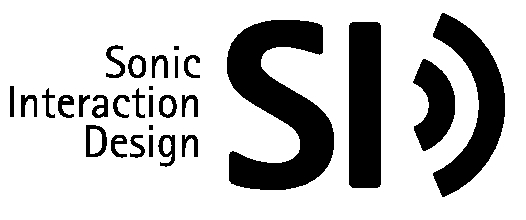Call for Short-Term Scientific Missions (STSMs)
Published
http://sid.soundobject.org/wiki/STSMCall6
Call for Short-Term Scientific Missions (STSMs)
in collaboration with COST – European cooperation in the field of scientific and technical research
Objectives of the STSM
Short-Term Scientific Missions (STSM) are aimed at strengthening the existing networks by allowing scientists to go to an institution or laboratory in another COST member state to foster collaboration, to learn a new technique or to take measurements using instruments and/or methods not available in their own institution/laboratory. They are particularly (yet not exclusively) intended for young scientists (especially PhD students).
Topics
COST-IC0601 Action on Sonic Interaction Design is organized into four Working Groups (WG). Emphasis is on activities that will contribute to the research on one of the topics of the 4 Action’s WGs. The applicants should, at the moment of the submission, specify to which of the 4 WGs their proposed mission belongs to. They should furthermore show clearly in their applications how the planned activities and the selection of Hosting Institution will contribute to this aim.
WG1 Percept – Perceptual, cognitive, and emotional study of sonic interactions
WG1 promotes STSMs focusing on basic research questions addressed in perceptual, cognitive, and emotional studies of sonic interactions. Research studies should be therefore aimed to the understanding of human sound reception in interactive contexts. The use of new experimental paradigms such as neurosciences, ergonomical and psycholinguistic studies are welcome.
WG2 Product – Product sound design
WG2 supports STSMs involving the design and evaluation of interactive products with a salient sonic behavior. The results of such STSMs should involve methods stressing emotional, perceptual and aesthetical qualities of sounding objects, and help designers in introducing sonic properties in their process.
WG3 Art – Interactive Art and Music
WG3 would like to encourage STSMs that explore the artistic, creative and critical potential of sound. We welcome artist-researchers from a variety of backgrounds such as art, music, design, architecture, sonic and performing arts as well as interdisciplinary approaches. The results of STSMs could contribute to understanding the role of sound in interactive art and music, suggest creative ways of using sound in interactive objects, environments or in the mobile context; other results might contribute to explaining the cultural and social context of sound.
WG4 Sonification – Sonification
WG4 supports STSMs that contribute to a better understanding, design and use of sonifications in interaction. This encompasses among others novel applications for sonification, the development of sonification techniques, their evaluation as well as research on theory and guidelines. The results of such STSMs would suggest novel ways to create or use informative sounds that support the interaction, or deliver an increased insight into involved data or information.
The Applicant
The selection of the applicant is the responsibility of the Management Committee (MC) of the Action. The Applicant should normally be engaged in a programme of research as a post graduate student or postdoctoral fellow or be employed in an institution of a COST Country having accepted the MoU of the Action. The Host can be public or private, and should be in a COST Country having accepted the MoU and participating in the COST Action. For the period of the STSM neither the Management Committee of the COST Action nor the COST Office may be considered as the employer and grantees must make their own arrangements for all health, social, personal security and pension matters. The Home and the Host Institution should be in a COST Member State having signed the MoU and participating in the COST Action. In exceptional cases a STSM may be approved from a Home Institution in a COST signatory country to a Host Institution in a non-COST country but not the other way round. The Applicant is responsible for obtaining the agreement of the Host Institution, before submitting his/her application.
Duration
Short-Term Scientific Missions, minimum one week (5 working days), maximum 3 months, shall be made within the time frame of the operation identified in the proposal and within the period of the Action.
Finance
The financial support is a contribution to the costs of a STSM and may not necessarily cover all the costs in each case. The grant should normally cover only travel and subsistence. The financial contribution for a STSM will be a fixed grant based on the Applicant’s budget request and the evaluation of the application by the STSM assessment committee. An amount of 60 to 90 eur for the daily allowance in particular for longer stays and 300 eur for the travel is recommended. The total of a STSM shall normally not exceed 2500 eur. Any exception needs special justification. If approved, the grant will be paid after completion of the STSM.
Application
The applicant should:
- fill the online application form at www.cost.esf.org
- send a detailed Work Plan and full Curriculum Vitae to the chair of the Action
Deadline
Applications for this call should be sent before December 31st 2009. Notifications of decisions will be sent by January 31st 2010. For this call, STSMs should take place before June 30th 2010.
After the STSM
After completion of the STSM the grantee is required to submit to the Host and MC chair a short scientific report on the visit within 4 weeks after his/her stay. The grantee is also required to produce a ‘’‘poster’‘’ and a ‘’‘slideshow’‘’ that illustrate the outcome of the STSM. Reports, posters, and slides may be published in the Action web site and displayed at MC meetings. Templates for posters and slides are provided here. It is highly advisable that the grantee, during the STSM, keeps an online progress report (website, diary, blog, etc.).
Further information and rules
Applicants are strongly encouraged to read the detailed information provided by COST on STSMs .
